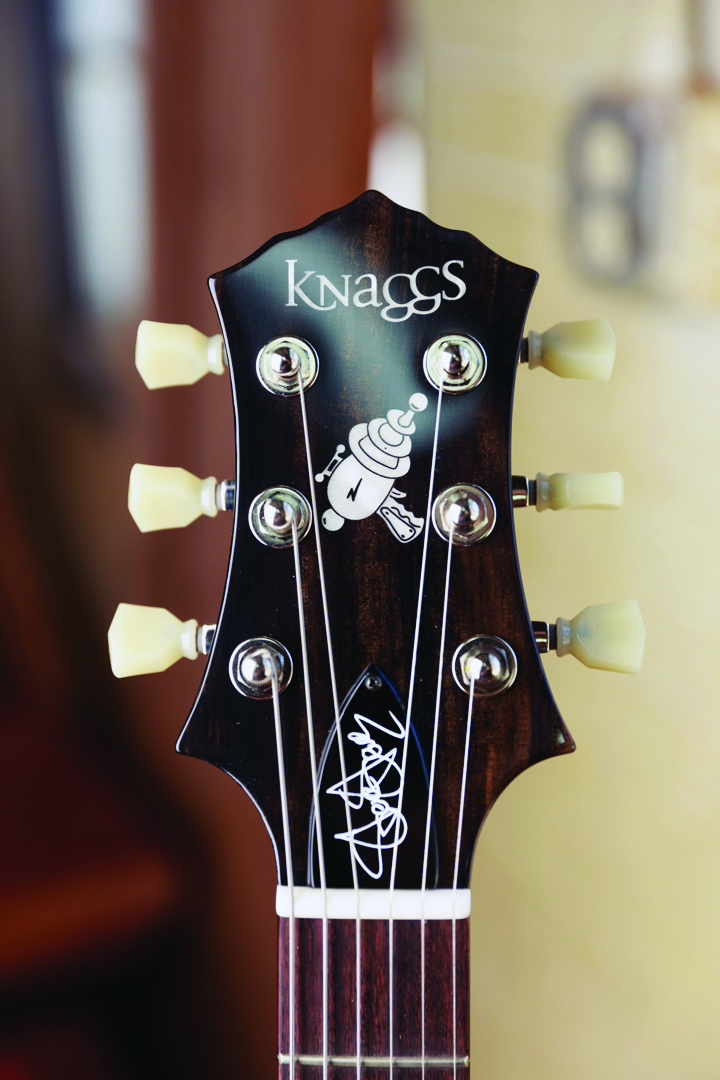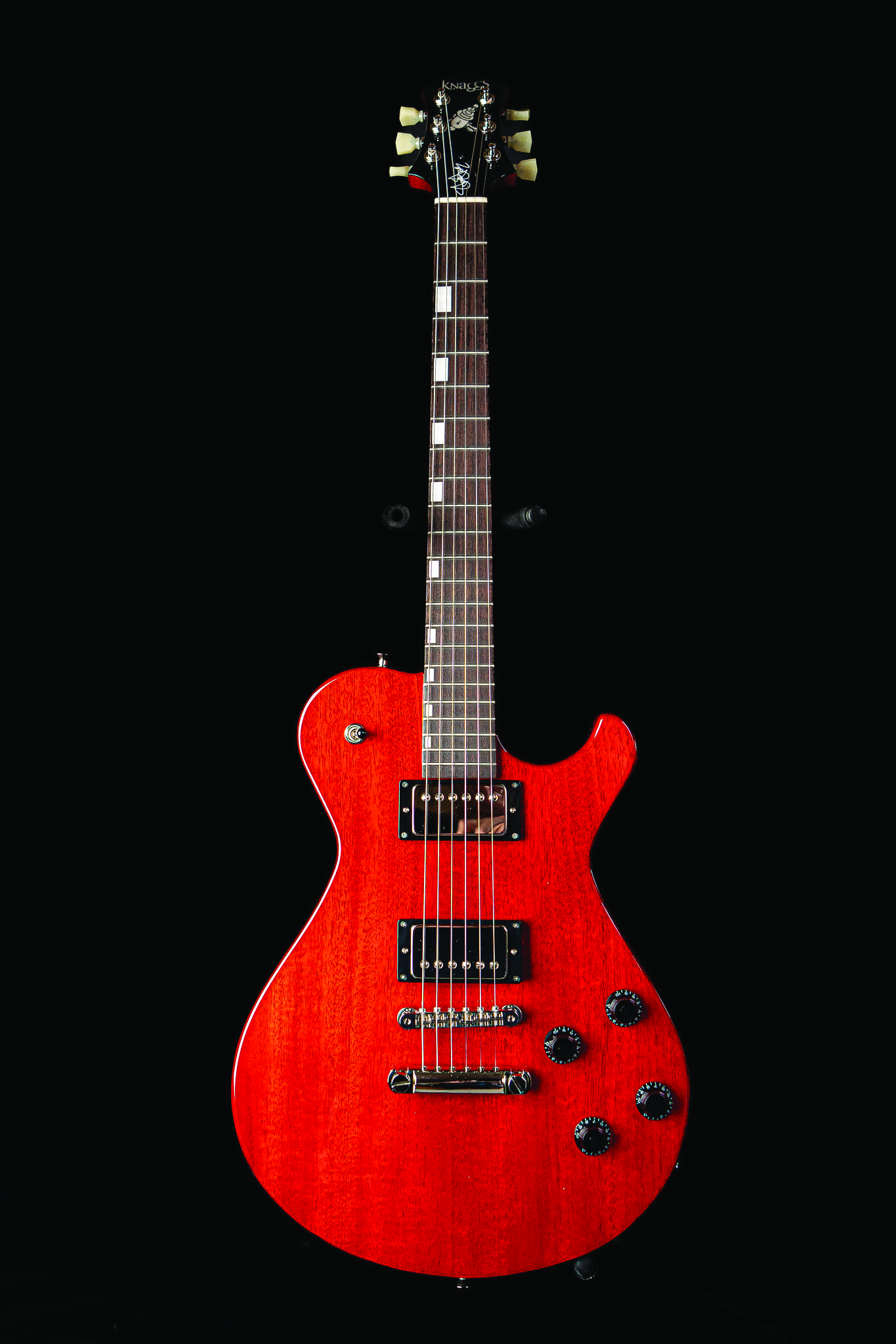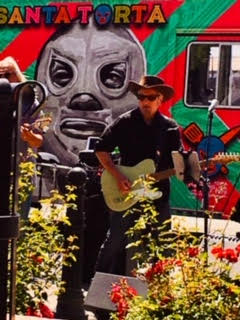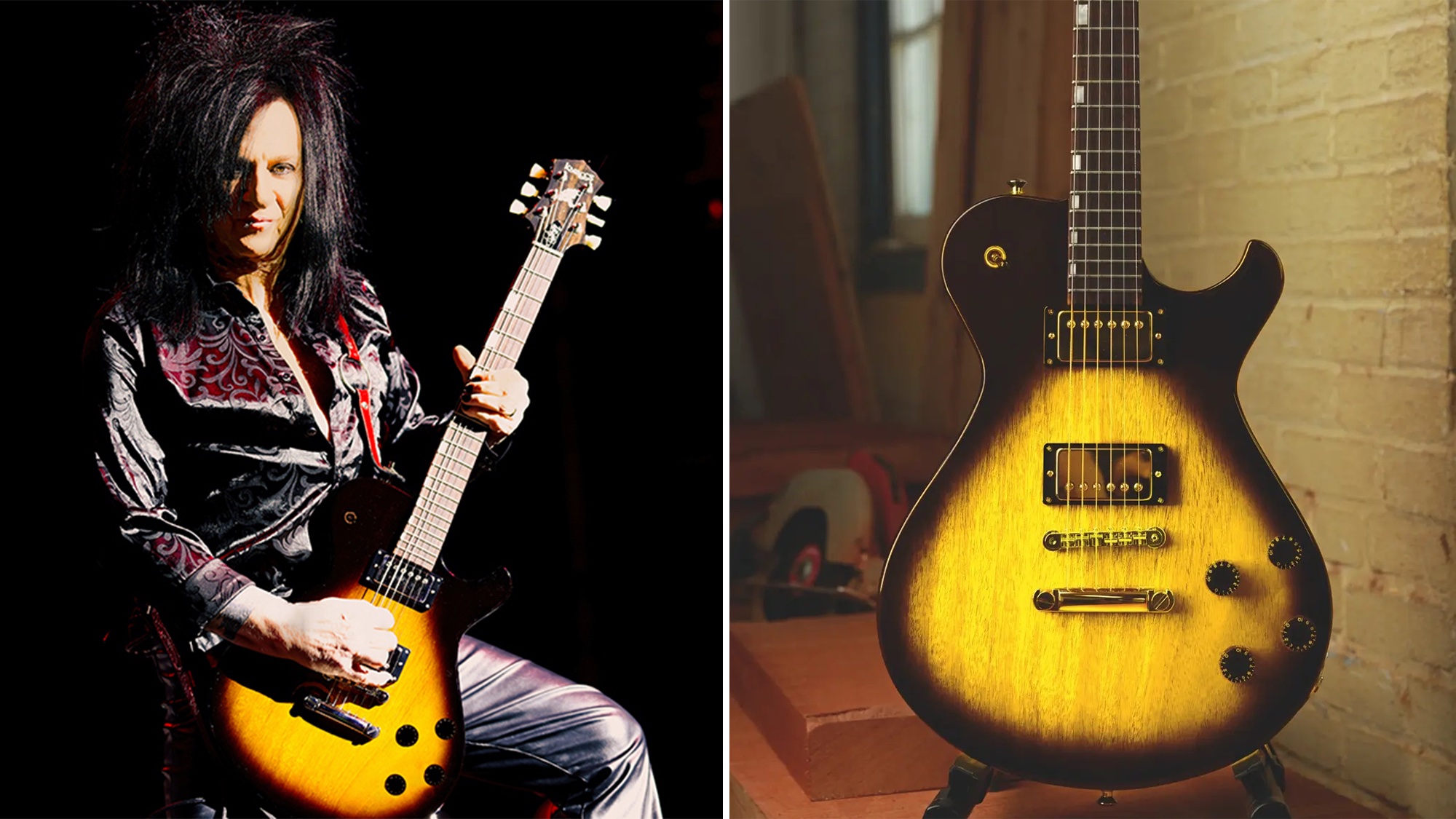GuitarPlayer Verdict
Great-sounding, inspiring to play, and beautifully crafted using premium woods and hardware, the SSC-J is pricey for sure, but you get your money’s worth in a guitar that’s the ne plus ultra of LP Junior–style axes
Pros
- +
Great rock sound from pickups
- +
Sumptuous graining on mahogany body
- +
Light and nimble
- +
Sweet intonation
Cons
- -
Pricey
You can trust Guitar Player.
To date, Knaggs has released several Steve Stevens models, including the SS1 SS2, SSC, SS Severn XF, and SS Potomac acoustic guitar. Now comes the SSC-J, a stripped-down LP Junior–inspired affair that has the distinction of being Stevens’ first signature model without a maple top.
It features a 24 ¾–inch scale mahogany set neck and a non-contoured mahogany body of choice with sumptuous graining that on my test model was highlighted by a BlackBurst nitrocellulose lacquer finish (see the specs chart for all the available colors).
Weighing in at under seven pounds, the guitar feels light and nimble. It’s an inspiring player, with its low action and well-groomed medium-jumbo frets on an East Indian rosewood ’board adorned with pearloid SSC block inlays that are like rectangular versions of Gretsch “thumbprint” markers.
Asked about the inspiration for this guitar, Stevens says, “As the regular SSC model is quite elaborate, we were looking for something more stripped down and at a lower price point. At the same time, I’ve always loved Les Paul Specials and Juniors – I would borrow Billy Idol’s ’59 Junior for some of our recordings – so the SSC-J neck was inspired by a ’59 reissue that I have.
“I’m a firm believer that part of the tone of the guitar is due to the front-to-back thickness of the neck. I think I naturally have two mindsets when playing a G-style or S-style guitar, but once there’s a Floyd Rose on a guitar, my brain almost switches gears.”
So does the slab mahogany body on the SSC-J greatly affect the tone compared to the SSC with its maple top? Stevens explained, “I was surprised at how different the tone is for a guitar without a maple cap on it. Besides having a more pronounced midrange, there’s an overall smoothness and a vibration you can really feel through the body of the guitar, as nothing is glued to the top. It has quickly become my favorite recording guitar.”

The glossy mahogany neck is set into the body and carries a rosewood ’board fitted with 22 gleaming, medium-jumbo frets with broad, even crowns and smoothly finished tips. A polished bone nut blends seamlessly into the end of the fingerboard, and the headstock is faced in ebony and has Stevens’ trademark “ray-gun” inlay along with his signature on the truss-rod cover.
All the latest guitar news, interviews, lessons, reviews, deals and more, direct to your inbox!
Tuning chores are handled by nickel-plated Klusons with vintage-style tulip buttons, and the strings traverse across a TonePros Tune-o-matic bridge and anchor into a stop tailpiece. The factory setup yielded sweet intonation in all positions, and I only needed to do a small truss-rod tweak to mitigate some buzzing caused by climate changes during the guitar’s trip from Maryland to California.
Tested through a Fender Deluxe Reverb, a ’72 Marshall JMP 50-watt head (into a pair of Celestion V30s), and a Matchless Chieftain 2x12 combo, the SSC-J delivered superb clean and distorted tones that were totally controllable from the guitar via its classic setup of dual volume and tone controls and a three-way switch. The Bare Knuckles SSC pickups might be likened to a slightly hotter PAF, while they retain all of that liveliness, clarity, and harmonic richness.

“I helped develop the perfect pickup with Tim Mills at Bare Knuckles awhile ago,” Stevens says. “I didn’t want much wax potting, so obviously we were going the vintage route, but at the same time I wanted something that could push your amp a little harder. So it’s loosely based on their Mule model, which was the first pickup of theirs I ever purchased.”
Fitted with nickel covers, these pickups give the SSC-J a great rock sound, with gobs of stringy presence and midrange heft. The volume circuit keeps the highs intact when you turn down, while the tone knobs allow for rolling off treble without masking note detail, which is great if you’re after a buttery, yet well-defined lead tone, or a burnished neck-pickup sound for a jazzier flavor.

The neck pickup is great for blues and roots in clean and overdriven modes, while the bridge ’bucker is killer for lead and dirty rhythm, delivering a walloping response that sounded great through the Marshall and a UAFX Lion ’68 Super Lead Amp pedal.
I dug the richness and complexity of the dual-pickup setting with the Matchless set to deliver its classic shimmering grind when the guitar was fully cranked (which is where the enhanced output of the BK SSC pickups comes in handy), or with distortion added from a selection of new OD boxes from Keeley. Through the Deluxe Reverb, the SSC-J was a natural for clean rhythm playing, as you can balance the bridge and neck volumes to get just the right balance of crispness and warmth to suit whatever style you point it at.
The SSC-J may be based on what was originally a student model in the Gibson lineup of the mid ’50s, but Knaggs’ rendition is a world-class axe that lives up to its status as a signature model. Great-sounding, inspiring to play, and beautifully crafted using premium woods and hardware, it’s pricey for sure, but you get your money’s worth in a guitar that’s the ne plus ultra of LP Junior–style axes.
Specifications
CONTACT Knaggs Guitars
PRICE $4,550 street
NUT Bone, 1.685” wide
NECK Mahogany, glued in. Ray-gun headstock inlay, Steve Stevens signature
on truss-rod cover, Ebony headstock veneer
FRETBOARD East Indian rosewood with SSC block inlays, 24.75” scale, 12” radius
FRETS 22 medium jumbo, (.104”/.047”)
TUNERS Vintage-style Kluson with tulip buttons, nickel plated
BODY Mahogany with BlackBurst finish
BRIDGE TonePros Tune-o-matic and stop tailpiece, nickel plated
PICKUPS Bare Knuckles SSC
CONTROLS Dual volume and tone controls, three-way switch
EXTRAS Nitrocellulose lacquer finish. Also available in Black, Vintage Cherry, Shell Pink, and TV Yellow. Dunlop StrapLok strap buttons. Hardshell case
FACTORY STRINGS D’Addario .010–.046
WEIGHT 6.8 lbs (as tested)
BUILT USA

Art Thompson is Senior Editor of Guitar Player magazine. He has authored stories with numerous guitar greats including B.B. King, Prince and Scotty Moore and interviewed gear innovators such as Paul Reed Smith, Randall Smith and Gary Kramer. He also wrote the first book on vintage effects pedals, Stompbox. Art's busy performance schedule with three stylistically diverse groups provides ample opportunity to test-drive new guitars, amps and effects, many of which are featured in the pages of GP.

